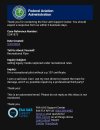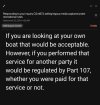Before Part 107 appeared, you had to have a real aeroplane licence to be able to fly drones commercially.
We went through a similar phase here. Originally our rule for "model aircraft" was simply don't be a hazard to manned aircraft or to people or property on the ground. But the definition of "model aircraft", as in the USA, included the wording that they were for recreational use. In Canada, any commercial use of remotely controlled aircraft required a full Special Flight Operations Certificate (SFOC) from Transport Canada.
The SFOC application and approval process was lengthy and cumbersome. With the advent of easy-to-fly drones, Transport Canada didn't have the manpower to handle all the SFOC applications. The regulations eventually changed, removing the artificial distinction between recreational vs commercial operation of remotely piloted aircraft.
If you fly, these are the rules. We don't care WHY you're flying. All that matters is WEIGHT class, WHERE you're flying, that you fly SAFELY while you're flying.
And of course, like your AMA, our Model Aeronautics Association of Canada (MAAC) protested that they didn't need new regulations. MAAC was issued an official exemption, provided they continued to operate safely by their own club rules under some other Transport Canada prescribed conditions.
That resulted in a similar (sort of) situation where the rules applied equally to everyone except MAAC members operating under their own rule set, which is (sort of) comparable to the USA with Part 107 versus Recreational Exemptions use.
Ultimately that MAAC exemption was revoked as a result of some MAAC member clubs not abiding by the set conditions. The Transport Canada regulations now apply equally to everyone, including MAAC members.
Which brings me to this...
Here's a different way of putting it: Do you think the regulations governing operation of their drones to be much more restrictive than for recreational pilots?
If we're playing word games, then no. Part 107 qualified pilots are allowed to operate in conditions not available to recreational pilots. So in that sense alone the regulations are
less "restrictive" for holders of a Part 107 licence than they are for Recreational pilots.
And what many people seem to ignore, or are not aware of, is that the Recreational exemption does not remove the need to abide by any regulations. Recreational flyers are required under
§ 44809(a)(2) to follow the rules set by your "Community Based Organization" (i.e. AMA, or whatever), even when you're flying at home and not actually flying at an AMA field.
You're still looking at it wrong. [...], "intent" certainly makes one flight more dangerous that another. [1] My 107 flights that can take place 2 miles away from me are much more risky than the 44809 rules which require VLOS at all time. [2] Same thing about flying in a 0 Grid in controlled airspace, or even on airport property. Again, more risky, requiring more training. 44809 does not allow operators to operate in either of those scenarios.
Nope.
You've provided two examples about
WHERE you need to fly, and have nothing to do with "intent" or the difference between recreational vs non-recreational.
We have similar differences in the required level of training. If I need to fly on airport property within controlled airspace, I am required to abide by the higher standards requirements set for
Advanced Operations. If I never have the need to fly in controlled airspace, the simpler
Basic Operations certificate is adequate. In either case, it makes no difference whatsoever whether the
intent of the flight is for my own fun or for business.
And since they aren't (or at least aren't supposed to be) partaking in the more risky flights, they don't need the more advances (& more expensive) training.
When you fly your drone, as you say, "
2 miles away from me", the level of
risk is no different whether you're doing it just for fun or for business. If you want to fly your drone BVLOS 2 miles away, you need to comply with Part 107, whether it's for fun or business. That's fine. The
same level of risk should require the
same level of regulation.
What I find ridiculous is the other stuff that comes up again and again in these forums, and that's the bit in the exemptions,
§ 44809(a)(1): "
The aircraft is flown strictly for recreational purposes." This has no bearing on the level of risk.
If you're not flying your drone 2 miles away, and you're not flying in controlled airspace, you're allowed to fly over your house or over your sailboat just for fun as long as you abide by the less onerous Recreational Exemptions. But people keep insisting you need a full Part 107 if you want to check for leaves in your roof gutters or you want to check the top of your sailboat's mast, because that's not a recreational activity.
The "intent" to have idle fun versus the "intent" to do something useful with your drone should NOT be the determining factor deciding which level of regulations apply. It's ridiculous.













